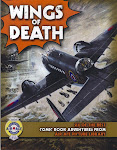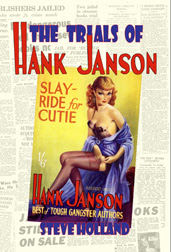The book under review (Counterfeit Spies by Nigel West [Rupert Allason], 1998) implied that Vacha's account was deliberate. Another reviewer of the book, Richard Norton-Taylor, said "Some of the books West cites were encouraged by the agencies to protect their operations. For example, A Spy for Churchill by Robert Vacha, a journalist who had been a wartime intelligence officer, claimed that Britain had an agent in Rommel's camp. In fact, detailed intelligence about Rommel's intentions in North Africa was the result of the interception of German radio traffic by the Government Code & Cypher School – the forerunner of GCHQ – whose successes Whitehall managed to keep secret for years. (The Guardian, 12 March 1998)
As someone who had read a couple of Vacha's novels donkey's years ago, I was surprised – especially as Vacha has published a "warning" that he had fictionalised parts of the main story and certain characters – that anyone would mistake A Spy for Churchill for anything other than a novel.
But I'll take any excuse to do a little digging as I knew almost nothing about Vacha.
Robert Vacha was born Dorab Robert Vacha in Antananarivo, Madagascar, on 15 January 1918. His family were originally from India and related to Dadabhoy Byramjee, one of the first natives of Western India educated under the European system (known as "Elphinstonians"). Originally a teacher and journalist, Byramjee came to London in around 1870 as an assistant in a commercial firm. After a brief apprenticeship, he established his own firm, Dadabhoy & Co. Ltd., which went on to have branches in America, Aden, Zanzibar, Bombay, Madagascar and other places. Dadabhoy died in Bombay in December 1908, aged about 80.
At the time of the 1891 census, two of Dadabhoy's grandchildren were living with him at his Lambeth home. Bapoojee ("Bapas" or "Bap") Dorabjee Vacha (1876-????) and Feroz Dorabjee Vacha (c.1883-1931), sons of Dorab Faridunji Vacha (????-1911), were both born in Bombay but educated in England. The two families were closely linked in business and Dadabhoy & Co., based at The Wool Exchange, London, Aden, Tananarive and elsewhere, was run by a partnership consisting of Pestonjee Byramjee, Dorabjee Furdoonjee Vacha, Feroz Dorabjee Vacha, Dorab Pestonjee Byramjee and Khusroo Dorabjee Vacha. Pestonjee, Dadabhoy's brother, and his nephew Dorab retired from the business on 31 December 1910, leaving the business in the control of the Vacha family.
Khusroo Dorabjee Vacha was born in Aden, a major port in Yemen, in c.1885 and was a partner and attorney for the business.
After the Great War, the company was run in partnership by Bapoojee Dorabjee Vacha, Feroze Dorabjee Vacha, Khusroo Dorabjee Vacha and Sorab Dorabjee Vacha. The latter three continued as partners in the company when Bapojee retired in June 1921. Around this time, Feroze and Sorab were both to be found in Madagascar, where at least three children were born—Robert (b. 1918), Sorab Francis Lynton Vacha (c.1919-1944) and Richard Rustom Vacha (b. 24 July 1921).
Khusroo, usually known as Kay Dorab Vacha, was living at 123 South Croxted Road, Dulwich [fl.1923] and could later be found living at 1a Collingwood Road, SW5 [fl.1929/30], 59 Mark Lane, EC3 [fl.1932], and at the business address 4 St. Mary Axe, EC3 [fl.1933/37], although he was then living with Elizabeth Vacha at Burnage Court, Lawrie Park Avenue, SE26 [fl.1933/36] and then at Flat 2, South Road, Honor Oak Park, Lewisham [fl.1937]. They were joined by Robert Dorab Vach in around 1938/39 at Flat 4, South Road, Honor Oak Park, Lewisham [fl.1939].
This was not an easy time for Khusroo Vacha. He had been involved in setting up a French-backed business to exploit Potash resources in the Dead Sea. At the same time he set up a company called the Madagascar Mining Syndicate Ltd. to press the claims of the Syndicat Francais des Potasses de la Mer Morte (SFPMM) against the British Colonial Office. As the French claim gained support, the Colonial Office, after an offer to the French government was rejected, prepared for the possibility of a protracted legal showdown.
However, the French Ministry of Foreign Affairs backed down from facing the Colonial Office before the League of Nations at the Hague and instead tried to pursue its claim through the British courts. After the case opened in July 1934, the British attorney general, Sir William Jowett, acting on behalf of the Palestine Potash Ltd. (PPL), the Colonial Office and the Foreign Office, questioned whether the High Court had any jurisdiction over the French claim; eventually it was decided it didn't, but ordered the Madagascar Mining Sydicate to pay £4,924 damages to PPL. Khusroo Vacha refused to pay and was pursued through the bankruptcy court and bankrupted in August 1935.
Khusroo was a 2nd Lieut. in the Royal Army Pay Corps.; he was on the casualty list in 1940 and died in Bromley, Kent, in 1942, aged 57. His son Francis Lynton Vacha, of the Reconnaissance Corps, R.A.C. (43rd Regiment (2/5th Bn, Gloucestershire Regt.), died in France on 5 August 1944, aged 24.
Robert Vacha worked for the Intelligence Corps during World War II in the Middle East and Europe. He was made a Major in 1949. (Biographies in his books say he was "a former Lieut.-Colonel in British intelligence" but I have yet to find a record of any further promotion.)
In 1950 he sailed to Nigeria to work as an administration officer for the Foreign Office, later becoming a District Officer before returning to Scotland in 1957.
Vacha became a staff foreign correspondent in Europe, Africa and the Middle East for various international newspapers. By 1965 and was living at 50 Graemesdyke Avenue, Richmond, and in the mid-1970s he worked on the Foreign Desk of the Daily Mail.
He was married to Beatrice Veitch Vacha (1922-1992) in Berlin, Germany, in the late 1940s. They had one son (Iain David Vacha, b. 1948), one daughter (Karen B. E., later Williamson). The family lived in Woodhall Spa, Lincolnshire, where Beatrice died in 1992. Robert subsequently moved to 18 Hawthorn Close, Hitchin, Hertfordshire, where he died, suddenly and peacefully, on 6 January 2002, aged 83.
A Spy for Churchill
Everest 0903-92519-2, 1974, 190pp, 60p.
With due regard to the Official Secrets Act, former wartime Intelligence officer author Robert Vacha tells of a mission into Rommel's HQ that tests every nerve and passion.Phantoms Over Potsdam
Informing the British Army of Rommel's strategy in North Africa while in the guise of a captured officer... going to Berlin to spend leaves with the German's wife and taking over as lover to her sister!
This fast, tense story explains what being a spy really means.
Sir Winston Churchill is on record as writing: "We had a spy in touch with Rommel's headquarters who gave us accurate information."
Fluent German speaking Robert Vacha knows what he is talking about... and in this story he tells as much as possible of one of the most daring stories of World War II.
Everest 0903-92554-0, 1975, 191pp.
The Name of the game was Brinkmanship.The OPEC Project
None of it made sense. There was no way East and West Germany could be reunited. If they holding talks, the British Foreign Office was far too discreet to leak the story.
Even if the FO wanted to spill the beans, Robert Craig was not the journalist they would talk to.
And if he published the story, that was no reason for him to be kidnapped in broad daylight outside his Berlin hotel...
But as Craig got embroiled in the international scheming surrounding the Potsdam talks, he discovered the reality was even more fantastic.
The British plan was the most terrifying exercise in Brinkmanship since the Cuban missile crisis.
And Craig was in the hot seat.
Robert Vacha's fact as fiction book A Spy for Churchill caused a furore by revealing the long kept secret of the British spy in Rommel's camp.
Star 0352-39543-5, 1977, 224pp.
--- [2nd? imp.] 1978.
Requiem for a Crown
Star 0352-30247-x, 1978, 206pp, 75p.
In 1945, in the chaos of the German defeat, the priceless thousand-year-old Holy Crown of St Stephen vanished from Budapest, along with a haul of precious stones worth millions. Stolen by Hungarian Nazis, the crown had been lost for over thirty years, and no-one had been able to solve the mystery of its disappearance. But with the balance of power in Easter Europe at its most precarious, there would be serious political repercussions if the crown were found...Moscow 1980
Colonel Craig, an agent for British Intelligence, had picked up the elusive trail. So had the KGB. Their collaboration with him had already resulted in the death of a key witness. The CIA were also involved. Craig couldn't guess how the puzzle pieced together, but he knew it could cost him his life to find out.
Star 0352-30258-5, 1979, 265pp, 95p.
Fearing a repeat of the 1972 Munich massacre, Soviet security around the Moscow Olympics was as tight as a clenched fist. Nothing could go wrong. EXCEPTThe Black Orchestra
The kidnap of a top Kremlin official.
The assassination of a beautiful girl from Moscow.
The gruesome murder of a top American athlete.
Red China, Soviet Russia, Israeli extremists... Each suspected the others.
And one man suspected them all.
Star 0352-30353-0, 1978, 253pp.
The Proton Plot
Star 0352-30502-9, 1980, 204pp, 90p.
TOP PRIORITY... to Robert Craig, British Intelligence... Assignment Brief... Cairo suburb Heliopolis destroyed... buildings reduced to dust... thousands dead—no corpses... weapon unidentifiable, untraceable... suspect extreme terrorist activity...Drop Dead in Dresden
Craig was sent to London to trace the source of the hideous destruction in Egypt. It was the first of a series of attacks on the world's major capitals. In the course of his mission, Craig was to tangle with the voluptuous neo-Nazi, Anya Kroll; infiltrate a wide-reaching Fascist underground; struggle through the most dangerous terrain in Africa; witness the devastation wreaked by the most staggering weapon since the H-bomb...
The Proton Plot: Tomorrow's apocalypse today.
Magread, 1983.
Translator
Highway to Hell by Heinz G. Konsalik, translated from the German (Die Rollbahn, Munich, Heyne, nn.d.). Henley on Thames, A. Ellis, 1976.
The Kaiser's Daughter. Memoirs of HRH Viktoria Luise, Duchess of Brunswick and Luneburg, Princess of Prussia, translated from the German (Ein Leben als Tochter des Kaisers, Im Glanz der Krone and Im Strom der Zeit, Hanover, Gottigen, 1965-74) and edited by Robert Vacha. London, W. H. Allen, 1977.






























































No comments:
Post a Comment